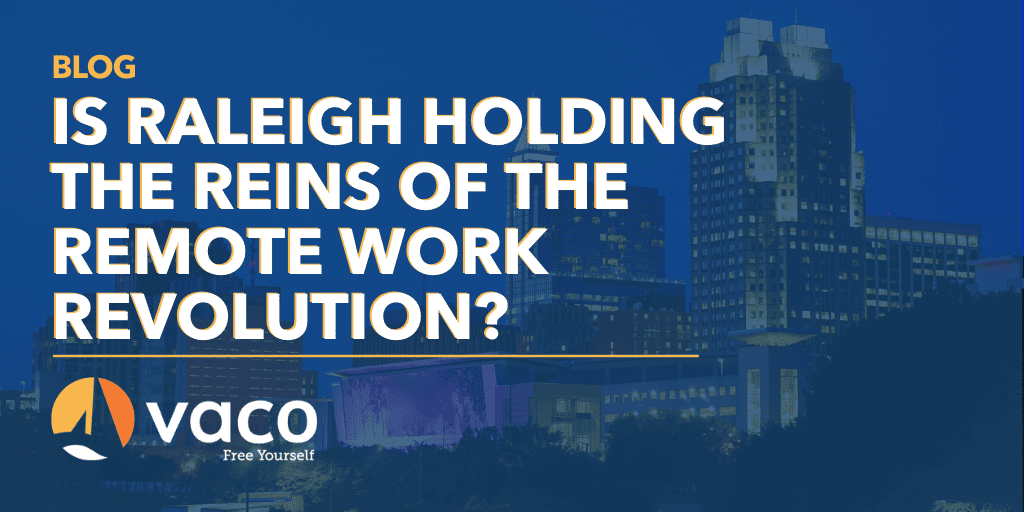On January 15, 2020, an article in the News and Observer reviewed Smart Asset’s study of 100 cities that ranked Raleigh 8th and Durham 15th for “Best Places to Work From Home.” Little did the world know at the time that only a couple of months later, such a listing would catapult from a “pat on the back” to a coveted pandemic-driven indicator of economic resiliency.
As COVID-19 precautions increased remote work to nearly 50% of America’s workforce, it became clear that a city known for flexibility would soon be presented with a stocked pool of highly skilled labor. This prompted the Triangle’s top innovative employers and economic developers to begin exploring the maximization of this phenomenon. By April, the entire state of North Carolina was recognized through WalletHub’s study as 9th overall for “Best States to Work from Home.” By May, numerous indicators such as Raleigh’s booming housing market fortified the idea that the Triangle’s post-pandemic economic rebound will be heavily supported by the draw and escalation of remote work culture.
This pivotal moment is rapidly terraforming the competitive landscape of talent recruitment. According to a recent survey by the Harvard Business School, one in six workers expects to continue working remotely a minimum of two days a week, post pandemic. As companies in Silicon Valley and New York City release workers from expensive rents, stressful commutes, and faraway families, the Triangle’s affordable cost of living and high quality of life is a shining beacon.
Can Raleigh hold the remote work reins?
Raleigh first topped the remote work lists by boasting one of the United States’ highest percentages of remote workers prior to the pandemic. Additionally, top remote work locations lists, like Business Insider’s, celebrated the number of full-time remote positions in Raleigh’s telecommute-friendly industries such as IT, healthcare, finance, real estate, and recruiting.
Combine an already thriving flexible work culture with a low cost of housing as a percentage of income, lower state taxes, high-speed broadband internet access, coworking spaces, highly rated schools and universities, recreation, and access to both the beach and the mountains, and it’s no wonder that even some of California’s top tier execs are headed this way.
What could cause the reins to slip?
However, even with all these wonderful qualities, some of the less desirable ones haven’t gone unnoticed. Raleigh’s exceptional “work environment” ranking was repeatedly dinged by the city’s “living environment” ranking. Issues that dropped the city to below average in this category include the high cost of electricity and the comparatively high cost of broadband internet packages.
Additionally, Raleigh’s low volume of coworking friendly coffee shops and bars made a serious impact on the remote work rankings. In fact, this issue is likely to have dropped Raleigh off of Livability.com’s 2020 list of 100 Best Places to Live. Durham ranked 9th on the list, with Asheville at 4th, Charlotte 13th, and Wilmington 43rd; but as the Triangle Business Journal was quick to note, “The City of Oaks is nowhere to be found.”
Keeping a tight grasp on remote work advantages
Raleigh employers and economic developers would be wise to embrace and prepare to bolster the desirable qualities that have led to top shelf remote work rankings. Conversely, mitigation should begin to address pandemic-related strains on restaurants, bars, and coffee shops that could exacerbate the gap already felt by the coworking culture.
The only way for employers to gain and maintain the lead in recruiting a premium remote workforce is to understand and cater to the priorities of telecommuting professionals. By incentivizing with technology, connectivity, and ergonomic “home” office packages; addressing flexibility requirements of those with family members who are also home; and re-considering unique co-working opportunities for those who prefer to collaborate face to face, Raleigh employers will become and remain highly attractive to this rapidly expanding talent pool.
Written by Vaco contributor Angela Fisher
Angela Fisher is a seasoned experiential strategist focused on project management and partnership development. She is the founder and co-owner of Populate Productions, a North Carolina-based event and media production agency. Angela is best known in the Triangle area for designing experiences that draw thousands of new customers to mixed-use developments and downtown businesses.
